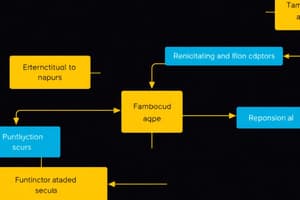Podcast
Questions and Answers
What do the logical operators && and || typically test for?
What do the logical operators && and || typically test for?
- Arithmetic calculations
- Special characters
- Bitwise operations
- Multiple conditions and decisions (correct)
Which operator is used for incrementing a variable by 1 in C programming?
Which operator is used for incrementing a variable by 1 in C programming?
- ++ (correct)
- -=
- --
- +=
What happens when the increment operator '++' is placed before a variable?
What happens when the increment operator '++' is placed before a variable?
- The variable is decreased by 1
- The variable is not incremented
- The variable is increased by 1 after assigning its current value
- The variable is increased by 1 before assigning its current value (correct)
In the expression 'a=a+1', what does the assignment operator '=' represent?
In the expression 'a=a+1', what does the assignment operator '=' represent?
Which operator is used to decrement a variable by 1 in C programming?
Which operator is used to decrement a variable by 1 in C programming?
What is the result of '5 * (7 + 3)'?
What is the result of '5 * (7 + 3)'?
'a *= (n + 1)' is an example of which operator in C programming?
'a *= (n + 1)' is an example of which operator in C programming?
What do preincrement and predecrement operators do in C programming?
What do preincrement and predecrement operators do in C programming?
How are logical operators || and && used in decision making?
How are logical operators || and && used in decision making?
Flashcards are hidden until you start studying
Study Notes
Decision Making: Relational Operators
- In C, the decision-making process is controlled by the
ifstructure, which allows a program to make a decision based on a condition's truth or falsity. - The condition in an
ifstructure is formed using relational operators. - Relational operators have the same level of precedence and associate left to right.
- Equality operators (== and !=) have a lower level of precedence than others and associate left to right.
- There is a subtle difference between
==and=:=is used for assignment, and==is used for comparison.
Relational Operators
- Examples of relational operators include
==,!=,<,>,<=,>=. - Relational operators are used to compare values and make decisions in a program.
Logical Operators
- Logical operators include
&&(Logical AND),||(Logical OR), and!(Logical NOT). - These operators are used to test more than one condition and make decisions.
- Logical operators can be used to create complex conditions.
Operator Precedence
- Multiplication, division, and modulus operations are evaluated first in an expression.
- If an expression contains several
*,/, or%operations, evaluations proceed from left to right. - Addition and subtraction are evaluated last in an expression.
- If an expression contains several
+or-operations, evaluations proceed from left to right.
Assignment Operators
- The assignment operator
=is used to assign a value to a variable. - Shorthand assignment operators, such as
+=,-=,*=, etc., can be used to simplify assignment statements.
Increment and Decrement Operators
- C provides the unary increment operator
++and unary decrement operator--. - The increment operator can be used to increment a variable by 1.
- The decrement operator can be used to decrement a variable by 1.
- The increment and decrement operators can be used as prefix or postfix operators.
- The meaning of the increment and decrement operators differs based on their placement before or after the variable.
Examples
- The
ifstructure can be used to compare values and make decisions in a program. - Logical operators can be used to create complex conditions in a program.
- Increment and decrement operators can be used to simplify increment and decrement operations.
Studying That Suits You
Use AI to generate personalized quizzes and flashcards to suit your learning preferences.




